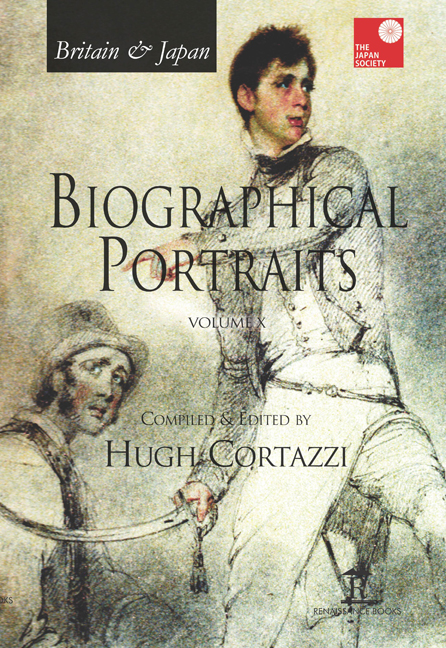Book contents
- Frontmatter
- Dedication
- Contents
- Introduction
- List of Contributors
- Index of Biographical Portraits in Japan Society Volumes
- PART I BRITAIN IN JAPAN
- PART II JAPAN IN BRITAIN
- Select Bibliography of Works in English on Anglo-Japanese Relations [Compiled by Gill Goddard – Retired East Asian Studies Librarian, University of Sheffield]
- Select Bibliography of Works in Japanese on Anglo-Japanese Relations [Compiled by Akira Hirano, SISJAC]
- Index
34 - John McEwan (1924–1969): Scholar of Japanese at Cambridge University
Published online by Cambridge University Press: 07 May 2022
- Frontmatter
- Dedication
- Contents
- Introduction
- List of Contributors
- Index of Biographical Portraits in Japan Society Volumes
- PART I BRITAIN IN JAPAN
- PART II JAPAN IN BRITAIN
- Select Bibliography of Works in English on Anglo-Japanese Relations [Compiled by Gill Goddard – Retired East Asian Studies Librarian, University of Sheffield]
- Select Bibliography of Works in Japanese on Anglo-Japanese Relations [Compiled by Akira Hirano, SISJAC]
- Index
Summary
INTRODUCTION
LIKE SO MANY Japanologists of his generation, John Robertson McEwan first came into contact with Japan as a result of the Second World War. He learnt Japanese in London and then played an active part in the war in East Asia as an interpreter and interrogator, but later he was a pioneer in Western scholarship on the history of ideas in the Tokugawa period. He was the first to write extensively on Ogyū Sorai (1666–1728), one of the towering intellects of the period, and his work on Sorai continues to be cited.
John McEwan was born in Dundee to Alan and Evelyn McEwan on 13 August 1924. His father was a draper; he had one sister who was thirteen years younger than him. He was educated at Harris Academy in Dundee and he is not known to have had any connections with Japan before he began his study of Japanese in May 1942 at the School of Oriental and African Studies (SOAS). This was six months after the attack on Pearl Harbor and three months after the fall of Singapore: the need for Japanese linguists at that time was acute and thus the Second World War changed his life.
Unfortunately, he left no diaries, letters or accounts of his life during the war or afterwards. Official records, the reminiscences of former colleagues and some of his writings give us glimpses of his life, but most of the details are wanting.
LEARNING JAPANESE
McEwan learnt his Japanese during the war on the first of the special courses run at SOAS. Shortly after the outbreak of war in Europe, SOAS was temporarily transferred to Christ's College, Cambridge, but the special war-time courses were taught in London, so it was in London that he spent most of 1942 and 1943 learning Japanese. An account of these courses is contained in The Japanese War, London University's WWII secret teaching programme and the experts sent to help beat Japan, by Sadao Oba, translated by Anne Kaneko, Japan Library, 1995.
At the end of the first year the boys were tested on their knowledge in two written examinations and an oral. McEwan came seventh out of the twenty-eight students remaining on the course.
- Type
- Chapter
- Information
- Britain & Japan Biographical Portraits Vol X , pp. 374 - 390Publisher: Amsterdam University PressPrint publication year: 2016

